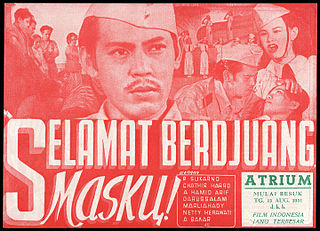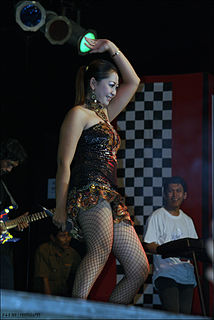
As it is a country with many different tribes and ethnic groups, the music of Indonesia itself is also very diverse, coming in hundreds of different forms and styles. Every region have its own culture and art, and as a result traditional music from area to area also uniquely differs from one another. For example, each traditional music are often accompanied by their very own dance and theatre. Contemporary music scene have also been heavily shaped by various foreign influences, such as America, Britain, Japan, Korea, and India.

Dangdut is a genre of Indonesian folk music that is partly derived and fused from Hindustani, Arabic and to lesser extent, Malay and local folk music. Dangdut is a most popular musical genre in Indonesia and a very popular in other Malay world countries as well because of its melodious instrumentation and vocals. Dangdut features a tabla and gendang beat.

Inul Daratista is a dangdut singer and performance artist from Pasuruan, East Java, Indonesia. She became nationally famous in 2003, and is known for her suggestive style of dancing that caused major controversy in Indonesia. Inul is a corrupted version of Ainur, and the singer's childhood pet name. As she began her musical career singing in a 'rock' band, she adopted the stage name Daratista.

Raden Haji Oma Irama, better known as Rhoma Irama, is an Indonesian dangdut singer, songwriter and guitarist of Sundanese descent.
Elvy Sukaesih is one of the most popular dangdut singers in Indonesia, and has been dubbed the Queen of Dangdut. Sukaesih has a significant fan base in other Asian countries such as Japan. She has been a prolific recording artist since the late 1960s.
A. Rafiq was a prominent Jakarta-based dangdut artist. He was active in the Indonesian music industry from the 1970s onwards. He launched his first single, "Pandangan Pertama" in 1978. The single was a huge hit and propelled his career in the Indonesian '70s dangdut scene. Rafiq, along with Rhoma Irama and Elvy Sukaesih were the three most popular dangdut singer in the '70s. Rafiq is well known for his Elvis-inspired stage costume and hip-gyrating movements.
Cementville is a 1991 dark comedy play written by Jane Martin, a Pulitzer-nominated author. It premiered at the Humana Festival of New American Plays on 1991. The work has also been republished in several collections of modern American plays.
Ida Nerina binti Hussain, better known by her stage name Ida Nerina, is a Malaysian actress, producer and director.

Benyamin Sueb was an Indonesian comedian, actor and singer. He released 46 studio albums and starred in more than 50 films. He received two Citra Awards for Intan Berduri in 1973 and Si Doel Anak Modern in 1975.

Sangham (transl. Society) is a 1954 Indian Telugu-language romantic comedy film, produced by M. Murugan, M. Saravanan and M. Kumaran under the AVM Productions banner and directed by M. V. Raman. It stars Vyjayanthimala and Anjali Devi in lead role alongside N. T. Rama Rao and S. Balachander in supporting roles, with music composed by R. Sudarsanam.

Indo-pop also known as Indonesian pop or I-pop is loosely defined as Indonesian pop music; however, in a wider sense it can also encompass Indonesian pop culture, which also includes Indonesian cinema and sinetrons.

Oma Irama Penasaran is an Indonesian film directed by A. Harris and starring Rhoma Irama and Yati Octavia. According to Andrew N, Weintraub the film "paints a picture of an underclass boy who falls in love with a girl whose family is rich".

Sajadah Ka'bah is an Indonesia drama which was released on 17 November 2011, directed by Rhoma Irama and starring Rhoma Irama and Ida Iasha.

Selamat Berdjuang, Masku! is a 1951 Indonesian film directed by R.H. Andjar Subyanto and starring Raden Sukarno and Marlia Hardi. It follows a former guerrilla leader who must pursue his love despite the interference of his former comrades.

Netty Herawaty was an Indonesian actress who made more than fifty films between 1949 and 1986.

Darussalam was an Indonesian actor who appeared in more than seventy films in his forty-year career. Born in Bengkulu, he studied to be nurse before migrating to theatre during the Japanese occupation of the Dutch East Indies, marrying Netty Herawaty while with the troupe Irama Masa. The couple spent the remainder of the occupation and the ensuing revolution touring the archipelago with a number of troupes. In 1949, Darussalam and Herawaty made their feature film debut in Fred Young's Saputangan, appearing in seven further Young productions before migrating to Djamaluddin Malik's Persari. During their eight years with the company, Darussalam and Herawaty travelled to the Philippines and Singapore and found popularity among audiences, though Darussalam remained in his wife's shadow.

Aminah Tjendrakasih is an Indonesian actress best known for her appearance as Lela in the television series Si Doel Anak Sekolahan. Beginning her career in her teenage years, Cendrakasih had her first starring role in 1955's Ibu dan Putri. She has since acted in more than a hundred feature films. In 2012 and 2013 she received Lifetime Achievement Awards from the Bandung Film Festival and the Indonesian Movie Awards, respectively.
Lestiani better known with the mononym Lesti is an Indonesian singer and actress and television personality of Sundanese origin. In her earliest releases, she is known as Lesti DA or Lesti Kejora.

Koplo or dangdut koplo is a subgenre of dangdut, Indonesian popular dance & folk music, that originated in East Java during the early 2000s. The genre gets its name from the slang term "koplo" which refers to a hallucinogenic drug that is sold cheaply in Indonesia. Dangdut koplo is played at a faster tempo than the standard dangdut music and said to make listeners "feel high" thus gives the same effect of consuming koplo pills. Koplo also differs musically from the regular dangdut in the dominant role of the drummer, which plays more complex drum patterns.












